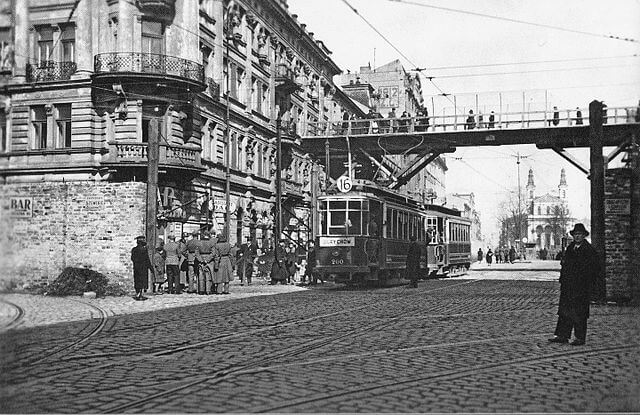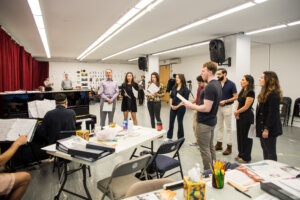How songs of the Jewish ghetto, camps and secret cabarets became a musical
The Folksbiene’s ‘Amid Falling Walls’ highlights three generations of one family’s work in Yiddish music

Graphic by Angelie Zaslavsky
Avram Mlotek remembers being 7 years old and performing a song about being an orphan while his father accompanied him on piano.
“I had no idea what I was singing about,” Mlotek, 36, a rabbi, cantor and social worker, recalled.
The songs he sang as boy, written during the Holocaust, in ghettos, in clandestine nightclubs and concentration camps, have become part of his DNA. “I think they really instilled within me, and from a very young age, singing as an act of resilience and almost spiritual self care,” he said.
In a sense it is genetic. Mlotek’s grandparents Yosl and Chana Mlotek edited five anthologies of Yiddish songs, which Avram’s brother Elisha recently compiled on the Workers Circle website. Mlotek’s father, Zalmen, produced three albums of Yiddish wartime music.
But even though Zalmen has long performed this music and serves as the artistic director of the National Yiddish Theatre Folksbiene, it took some convincing for him to agree to return these songs — many of which were performed in cabarets or as public acts of defiance — to a theatrical setting. Avram says Zalmen was reluctant to stage the songs as a theater piece, aware of how raw the material was. When Folksbiene Associate Artistic Director Motl Didner kept insisting, Avram wrote a libretto and Zalmen arranged and curated the score. The result, a work that took both two years and several lifetimes, will debut at the Folksbiene Nov. 14 as Amid Falling Walls, with Didner directing.
The play, named for a lyric in Hirsh Glick’s “Zog Nit Keynmol (I’ll never say),” also known as the “Partisan’s Hymn,” is drawn from the Mloteks’ research and the efforts of Shmerke Kaczerginski, a poet who preserved ghetto life as part of the famous Paper Brigade. It’s not a conventional book musical — the songs and the people who wrote them as testimony are the main characters.
“It’s not a play set in 1939 or anything like that,” said Steven Skybell, who won a Drama Desk Award for playing Tevye in the Folksbiene’s Yiddish Fiddler. “In that regard, it’s perfect for the Museum of Jewish Heritage because it really is about opening up these voices from history.”
Sung through and narrated almost entirely in Yiddish, the show has an ensemble of eight who veer from songs of the streets, to ones debuted at secret cabarets to the partisans’ fight songs. Archival projections lend context to what was happening in Europe when the songs were composed or performed.

Almost all of the music and testimony and poems were composed by young people, like Glick, who was 21 when he wrote the “Partisan’s Hymn,” and died at 22. One of Skybell’s solos, “Frilling,” is a tango about a man who returns to his ghetto to find it liquidated and learns his wife has died. Other songs include a comic, pre-war duet about gangsters whose melody was repurposed during World War II.
Since Oct. 7, when Hamas attacked Israel, prompting Israel’s retaliation, the material feels more urgent. Avram Mlotek says a poem written by an 11-year-old girl, in which her mother explains that “Jew haters” are keeping them from walking on certain streets, now registers as particularly poignant.
The songs and texts are cathartic, Skybell says, “because they can give voice to concerns of the time which are somehow similar now, more so than they were two months ago.”
Rachel Zatcoff, who played Tzeitel in Yiddish Fiddler, said that “the air is different” in the rehearsal room after the start of the war in Israel and Gaza, but found comfort in performing the work of artists whose grit shines through, finding comfort and hope even in something like the sun on your fingertips.
“Somebody just showed me a video in rehearsal of this group of musicians and singers that are in hospital rooms in Israel right now just singing and making music and it’s beautiful,” said Zatcoff. “Music heals and storytelling is important.”
For Mlotek, who couldn’t have foreseen the events playing out in Israel, it has made this testimony — and his stewardship of it — all the more important.
“As someone who feels humbly as an inheritor of this material,” Mlotek said, “it feels so powerful to be part of this thread and this chain of people who turn inward, and continue living and expressing their humanity as people try to undermine that humanity.”






















